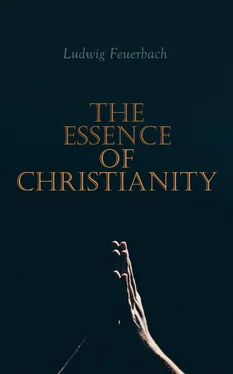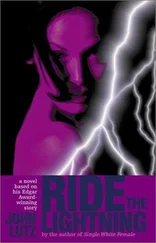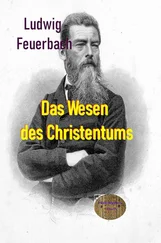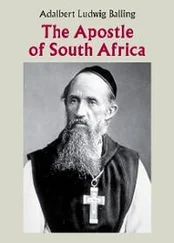Protestantism has set aside the Mother of God; but this deposition of woman has been severely avenged. 8The arms which it has used against the Mother of God have turned against itself, against the Son of God, against the whole Trinity. He who has once offered up the Mother of God to the understanding, is not far from sacrificing the mystery of the Son of God as an anthropomorphism. The anthropomorphism is certainly veiled when the feminine being is excluded, but only veiled—not removed. It is true that Protestantism had no need of the heavenly bride, because it received with open arms the earthly bride. But for that very reason it ought to have been consequent and courageous enough to give up not only the Mother, but the Son and the Father. Only he who has no earthly parents needs heavenly ones. The triune God is the God of Catholicism; he has a profound, heartfelt, necessary, truly religious significance, only in antithesis to the negation of all substantial bonds, in antithesis to the life of the anchorite, the monk, and the nun. 9The triune God has a substantial meaning only where there is an abstraction from the substance of real life. The more empty life is, the fuller, the more concrete is God. The impoverishing of the real world and the enriching of God is one act. Only the poor man has a rich God. God springs out of the feeling of a want; what man is in need of, whether this be a definite and therefore conscious, or an unconscious need,—that is God. Thus the disconsolate feeling of a void, of loneliness, needed a God in whom there is society, a union of beings fervently loving each other.
Here we have the true explanation of the fact that the Trinity has in modern times lost first its practical, and ultimately its theoretical significance.
1.“Dei essentia est extra omnes creaturas, sicut ab æterno fuit Deus in se ipso; ab omnibus ergo creaturis amorem tuum abstrahas.”—John Gerhard (Medit. Sacræ, M. 31). “If thou wouldst have the Creator, thou must do without the creature. The less of the creature, the more of God. Therefore, abjure all creatures, with all their consolations.”—J. Tauler (Postilla. Hamburg, 1621, p. 312). “If a man cannot say in his heart with truth: God and I are alone in the world—there is nothing else,—he has no peace in himself.”—G. Arnold (Von Verschmähung der Welt. Wahre Abbild der Ersten Christen, L. 4, c. 2, § 7).
2.“Exigit ergo Deus timeri ut Dominus, honorari ut pater, ut sponsus amari. Quid in his præstat, quid eminet?—Amor.” Bernardus (Sup. Cant. Serm. 83).
3.Just as the feminine spirit of Catholicism—in distinction from Protestantism, whose principle is the masculine God, the masculine spirit—is the Mother of God.
4.“Dum Patris et Filii proprietates communionemque delectabilem intueor, nihil delectabilius in illis invenio, quam mutuum amoris affectum.”—Anselmus (in Rixner’s Gesch. d. Phil. II. B. Anh. p. 18).
5.“Natus est de Patre semper et matre semel; de Patre sine sexu, de matre sine usu. Apud patrem quippe defuit concipientis uterus; apud matrem defuit seminantis amplexus.”—Augustinus (Serm. ad Pop. p. 372, c. 1, ed. Bened. Antw. 1701).
6.In Jewish mysticism, God, according to one school, is a masculine, the Holy Spirit a feminine principle, out of whose intermixture arose the Son, and with him the world. Gfrörer, Jahrb. d. H. i. Abth. pp. 332–334. The Herrnhuters also called the Holy Spirit the mother of the Saviour.
7.“For it could not have been difficult or impossible to God to bring his Son into the world without a mother; but it was his will to use the woman for that end.”—Luther (Th. ii. p. 348).
8.In the Concordienbuch, Erklär. Art. 8, and in the Apol. of the Augsburg Confession, Mary is nevertheless still called the “Blessed Virgin, who was truly the Mother of God, and yet remained a virgin,”—“worthy of all honour.”
9.“Sit monachus quasi Melchisedec sine patre, sine matre, sine genealogia: neque patrem sibi vocet super terram. Imo sic existimet, quasi ipse sit solus et Deus. (Specul. Monach. Pseudo-Bernard.) Melchisedec ... refertur ad exemplum, ut tanquam sine patre et sine matre sacerdos esse debeat.”—Ambrosius.
Конец ознакомительного фрагмента.
Текст предоставлен ООО «ЛитРес».
Прочитайте эту книгу целиком, купив полную легальную версию на ЛитРес.
Безопасно оплатить книгу можно банковской картой Visa, MasterCard, Maestro, со счета мобильного телефона, с платежного терминала, в салоне МТС или Связной, через PayPal, WebMoney, Яндекс.Деньги, QIWI Кошелек, бонусными картами или другим удобным Вам способом.












